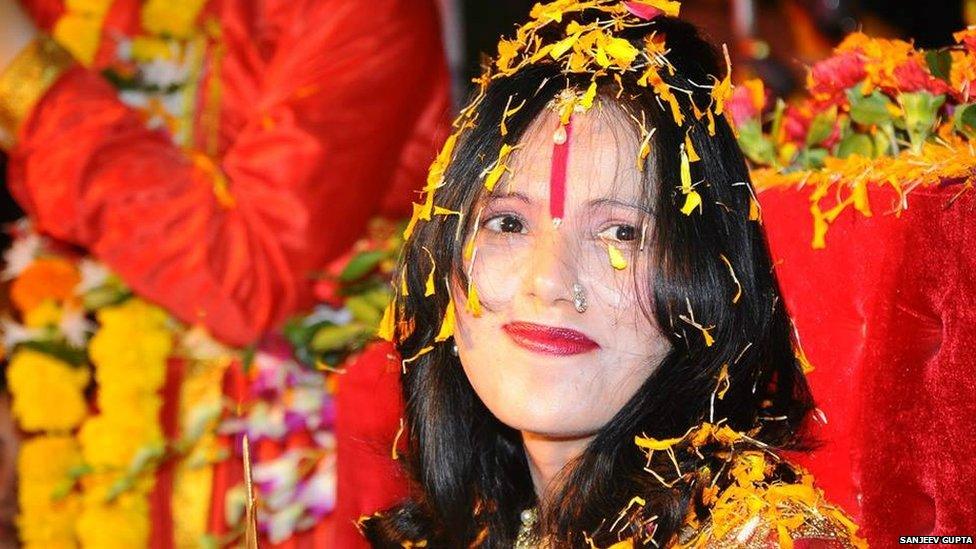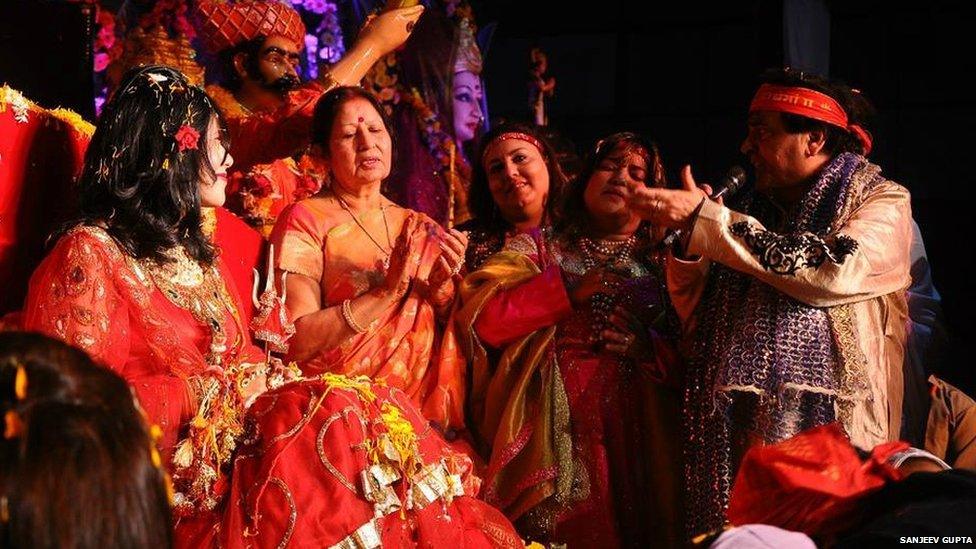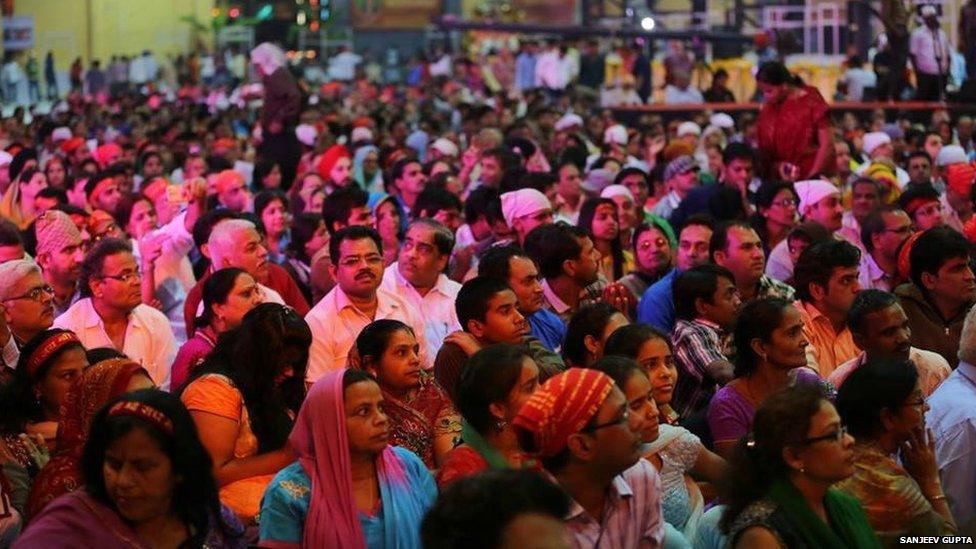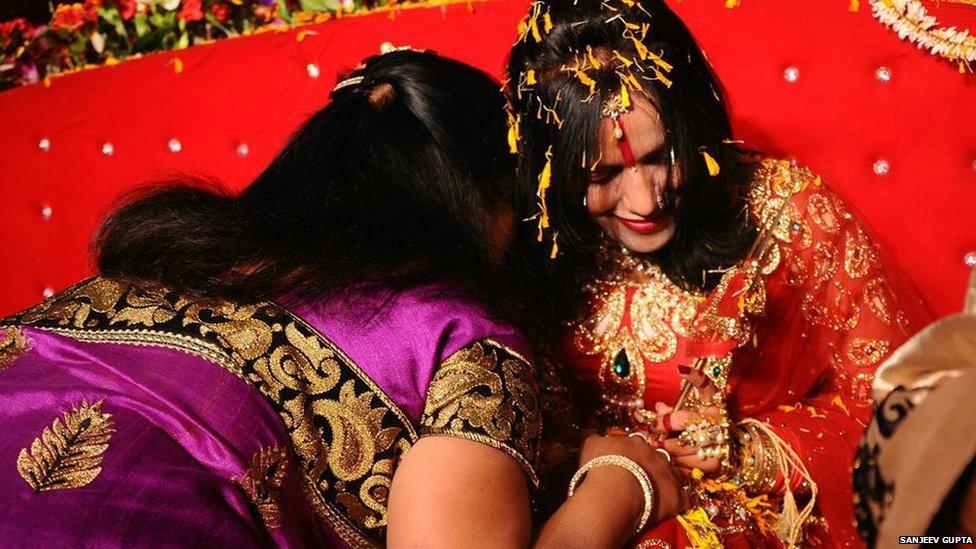Radhe Maa: Why is India's 'godwoman' in the news?
- Published

Indian "godwoman" Radhe Maa has hit headlines in recent weeks after police said they were investigating her in connection with a dowry harassment case and images showing her dressed in a short skirt and dancing to a raunchy Bollywood number surfaced on social media. The BBC's Geeta Pandey in Delhi profiles the controversial personality.
According to her followers, Radhe Maa - or mother Radhe - is a reincarnation of the fiery Hindu goddess Durga, has supernatural powers and can perform miracles.
Reports say her religious congregations draw thousands. The attractive 50-year-old is known to dance with her devotees and allows them to lift and carry her.
She blesses them by letting them kiss her hand - the more privileged among them can even plant a peck on her cheek.
And red is her favourite colour - she appears at her congregations in bright red and gold saris, bedecked with elaborate gold and diamond jewellery. She carries a golden trident and often sports a glittering crown.

According to her official website, external though, Radhe Maa comes from humble beginnings.
Born in April 1965 in Punjab's Gurdaspur district, she was named Sukhwinder Kaur. She lost her mother when she was five and was raised by her father, a Punjab government official.
When she turned 18, she was married off to a man whose family owned a small sweet shop in the village. The couple had two sons and she took up tailoring work to supplement her husband's income.
But when her husband decided to "explore business opportunities on foreign shores, leaving his young wife and two children behind", she was completely dejected.
Worried at her state, her father took her to a religious guru who spotted her "spiritual gifts" and encouraged her to visit his ashram (commune) and temple as often as she pleased.
The site hastens to add however, that she was keen on religion from a young age and while other children played with dolls and toy houses, she hung out in Hindu and Sikh temples.
"Even as a child, she was considerate, sensitive, delicate and helpful. Her teachers and friends in those early years remember that she also had the gift of prophesy," it says, adding that "the same teachers and classmates are now her devotees".

"Around the age of 23, she decided that she was no longer a householder and dedicated herself completely to God", it adds.
A few years later, she moved to Mumbai, and today has travelled a long way from her humble beginnings. Today, through her trust, she runs two ashrams (communes) where her gatherings are attended by several hundred people at a time. Apart from all her red and gold finery, she also owns several luxury cars.

A fleet of cars is parked at Radhe Maa's ashram
But in the last few days, her charmed life has begun to unravel and she is increasingly being painted as another charlatan defrauding the gullible by pretending to have direct access to gods and goddesses.
Last week, the organisers of the one of India's biggest Hindu festivals, the Kumbh Mela, barred her from attending the congregation, external until she was cleared of all charges in a dowry harassment case. The charges against her have been levelled by a 32-year-old woman who lodged a police complaint in Mumbai alleging that her husband's family had harassed her and demanded more dowry from her on Radhe Maa's instigation.
Radhe Maa has denied the charges. She told BBC Hindi's Sushant Mohan that she was "innocent" and that the allegations were "false and fabricated".
Mumbai police, nevertheless, have said they want to question her in connection with the case.
Then, Bollywood actress Dolly Bindra - a former devotee - lodged a complaint with the police saying she had received threat calls and that she suspected Radhe Maa to be behind them, external.

Her image took a further beating after photographs emerged showing her dressed in a red mini skirt and red boots, external amid reports that she had also been videoed dancing to Bollywood numbers, inviting ridicule on social media. The tag #YoRadheMaaSoRed was the top Twitter trend in India for an entire day with tweets like these:

While critics have accused her of obscenity, her aide Sanjeev Gupta has defended her choice of clothing saying that they were gifts from her devotees in the West and she wore them "because she didn't want to hurt their sentiments".
The explanation, however, has failed to convince her followers and this week, when BBC Hindi's Sushant Mohan visited her ashram in Mumbai's Borivali district, he found it deserted.
With her devotees replaced by a scrum of nosy journalists and police in hot pursuit, what the controversial "godwoman" really requires now is some divine intervention to help her get out of the sticky situation she is in.